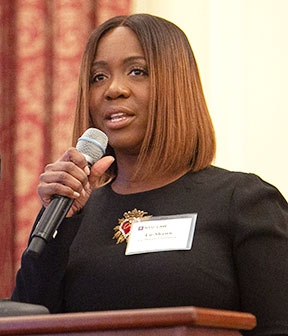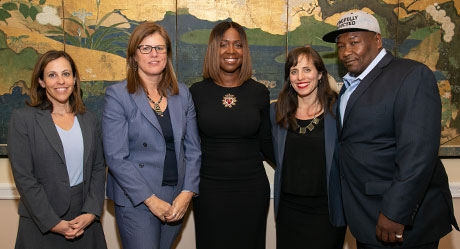Inaugural Kenneth P. Thompson ’92 Lecture highlights what prosecutor’s offices can do to correct wrongful convictions
On March 27, the legacy of the late Kenneth P. Thompson ’92, Brooklyn’s first black district attorney, was honored with the inaugural Kenneth P. Thompson ’92 Lecture on Race and Criminal Justice Reform. The event focused on the importance of internal review units in prosecutor’s offices to reexamine past cases and exonerate the wrongfully convicted. The Conviction Review Unit that Thompson launched at the Brooklyn District Attorney’s office in 2014 has helped to clear 24 people of wrongful convictions as of February 2019.
A gift from Lu-Shawn Thompson in memory of her husband, who passed away in 2016, established the annual lecture as part of the Ken Thompson Social Justice Fund. The fund seeks to advance racial equity in the criminal justice system through lectures, panels, and student scholarships.
“NYU Law School held a very special place in my husband’s heart,” said Lu-Shawn Thompson, in her introductory remarks at the event. “It is my sincere wish that this [event] sparks discussion and action to continue the important work my husband committed himself to.”
The evening was structured as a panel discussion instead of a lecture, in order to include experts from across the criminal justice system. These panelists included: Patricia Cummings, supervisor of the conviction integrity and special investigations unit for the district attorney’s office in Philadelphia; paralegal Derrick Hamilton, who in 2015 was exonerated by Thompson of a wrongful murder conviction; and Nina Morrison ’98, senior staff attorney at the Innocence Project, an organization that uses DNA testing to overturn wrongful convictions. Vice Dean and Segal Family Professor of Regulatory Law and Policy Rachel Barkow served as moderator. The event was co-hosted by the Center on Race, Inequality, and the Law and the Center on the Administration of Criminal Law.
Barkow explained that a conviction integrity unit (CIU) is a division within a prosecutor’s office created to review dubious convictions and field requests to review past cases. While there are currently around 45 such units across the nation, many lack full-time, dedicated staff to handle a high volume of requests. This is partly because there is no national requirement for integrity units nor staffing or funding requirements among those that exist, Cummings said.
“Based on the jurisdiction, although you may have the commitment to try do to those things, often times you may be very limited in terms of what you can do.” Cummings said. “I think it’s important to have a national conversation about them so we can all work together to figure out what are the tools that units have to have in order to accomplish the goals that they have set out.”
The panelists acknowledged that many are skeptical that prosecutors’ offices can fairly evaluate their own past convictions for mistakes. However, the panelists agreed that prosecutors’ access to information makes them uniquely able to take on this work.
“There’s this inherent tension between retrospective review of wrongful convictions and a system trying to acknowledge and own up to its own mistakes,” Morrison said. “But of the 20 or so people that I’ve represented so far, I think there’s probably a third of them that would still be in prison today if not for one or more prosecutors…not just doing what they are supposed to do, or obligated to do, but going above and beyond.”
Overturning wrongful convictions requires an enormous amount of previously unseen or unexamined evidence, Morrison said. Prosecutor’s offices have access to jailhouse informant information, can receive cooperation from other jurisdictions, and have credibility with judges and potential witnesses.
What is most important, Hamilton said, is having someone at the helm of these units who, like Kenneth Thompson, believes that prosecutors have an obligation to identify and exonerate the wrongfully convicted.
“Ken Thompson led with a mandate—changing the way things are handled in Brooklyn,” Hamilton said. “The key is to have somebody that’s fair, somebody that is able to be fair to the courts and fair to the accused, and more than anything, someone who believes in transparency.”
Posted April 18, 2019



